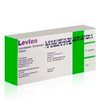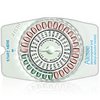 | Yasmin Active Ingredient: Drospirenone Ethinyl Yasmin is used for preventing pregnancy. Other names for this medication: Show all |
INDICATIONS
Yasmin is used for preventing pregnancy. Yasmin is a progesterone and estrogen combination birth control pill. It works by preventing ovulation, thickening the mucus in the cervix, and changing the lining of the uterus.
INSTRUCTIONS
Use Yasmin as directed by your doctor.
- Take Yasmin by mouth with or without food.
- Talk with your doctor about how you should start to take your first pack of Yasmin. If you begin to take Yasmin during the first 24 hours of your period, you do not need to use an extra form of birth control. If you begin to take Yasmin on the Sunday after your period starts, you will need to use an extra form of birth control for 7 days after you start taking Yasmin.
- If you are switching from another birth control pill to Yasmin, start Yasmin on the same day that would have started a new pack of your previous birth control pills. Talk with your doctor if you have any questions about how to switch from another form of hormonal birth control to Yasmin.
- Take Yasmin at the same time every day, not more than 2 hours apart. After taking the last pill in the pack, start taking the first pill from a new pack the very next day.
- For Yasmin to be effective, it must be taken every day. Do not skip doses even if you do not have sex very often. Do not skip pills if you are spotting, bleeding, or nauseated. If you have these side effects and they do not go away, check with your doctor.
- If you miss 1 dose of Yasmin, take it as soon as you remember. Take your next dose at the regular time. This means you may take 2 doses on the same day. You do not need to use a backup form of birth control if you only miss 1 pill. If you miss more than 1 dose, read the extra patient leaflet that comes with Yasmin or contact your doctor for instructions. You must use a backup form of birth control if you miss more than 1 dose. If you are not sure how to handle missed doses, use an extra form of birth control (eg, condoms) until you talk with your doctor.
Ask your health care provider any questions you may have about how to use Yasmin.
STORAGE
Store Yasmin at 77 degrees F (25 degrees C). Brief storage at temperatures between 59 and 86 degrees F (15 and 30 degrees C) is permitted. Store away from heat, moisture, and light. Do not store in the bathroom. Keep Yasmin out of the reach of children and away from pets.
MORE INFO:Ingredients: Drospirenone and Ethinyl Estradiol.
Do NOT use Yasmin if:
- you are allergic to any ingredient in Yasmin
- you are pregnant or think you may be pregnant
- you have a history of blood clotting problems, severe blood clots (eg, in the lungs, legs, eyes), certain blood vessel problems (eg, bleeding in the brain, heart attack, stroke), or breast cancer
- you have certain heart problems (eg, heart valve problems, certain types of irregular heartbeat); chest pain caused by angina; certain blood problems (eg, porphyria); certain types of headaches or migraines with aura; severe or uncontrolled high blood pressure; diabetes that affects circulation; endometrial, cervical, or vaginal cancer; estrogen-dependent growths; or undiagnosed abnormal vaginal bleeding
- you have kidney disease, adrenal disease, liver disease or liver tumors, or a history of yellowing of the eyes or skin caused by pregnancy or prior birth control use
- you have had surgery and are or will be confined to a bed or a chair for an extended period of time
- you are older than 35 years old and you smoke 15 or more cigarettes per day.
Contact your doctor or health care provider right away if any of these apply to you.
Some medical conditions may interact with Yasmin. Tell your doctor or pharmacist if you have any medical conditions, especially if any of the following apply to you:
- if you are pregnant, planning to become pregnant, or are breast-feeding
- if you are taking any prescription or nonprescription medicine, herbal preparation, or dietary supplement
- if you have allergies to medicines, foods, or other substances
- if you have a history of endometriosis, growths in the uterus, abnormal mammogram, irregular menstrual periods, abnormal vaginal bleeding, a lump in the breast, or fibrocystic breast disease, or if a family member has had breast cancer
- if you have a history of diabetes or high blood sugar, gallbladder problems, migraines or severe or persistent headaches, heart problems, high blood pressure, high blood cholesterol or lipid levels, kidney or liver problems, blood or bleeding problems, mental or mood problems (eg, depression), lupus, high blood calcium or potassium levels, chorea (jerky, involuntary movements of the face, arms, or legs), varicose veins, yellowing of the eyes or skin, pancreas problems, or seizures
- if you smoke, are very overweight, have not yet had your first menstrual period, or have fluid retention or swelling problems
- if you will be having surgery or will be confined to a bed or a chair for a long period of time.
Some medicines may interact with Yasmin. Tell your health care provider if you are taking any other medicines, especially any of the following:
- Aldosterone blockers (eg, eplerenone), angiotensin converting enzyme (ACE) inhibitors (eg, enalapril), angiotensin receptor blockers (eg, losartan), heparin, nonsteroidal anti-inflammatory drugs (NSAIDs) (eg, naproxen), potassium supplements, or potassium-sparing diuretics (eg, spironolactone) because the risk of high blood potassium levels may be increased
- Acetaminophen, ascorbic acid (vitamin C), or atorvastatin because they may increase the risk of Yasmin's side effects
- Azole antifungals (eg, ketoconazole) or HIV protease inhibitors (eg, ritonavir) because they may decrease Yasmin's effectiveness, resulting in pregnancy or breakthrough bleeding, or they may increase the risk of Yasmin's side effects
- Aprepitant, barbiturates (eg, phenobarbital), bosentan, carbamazepine, felbamate, griseofulvin, hydantoins (eg, phenytoin), modafinil, nevirapine, penicillins (eg, ampicillin), phenylbutazone, rifampin, St. John's wort, tetracyclines (eg, doxycycline), topiramate, or troglitazone because they may decrease Yasmin's effectiveness, resulting in breakthrough bleeding or pregnancy
- Beta-blockers (eg, propranolol), corticosteroids (eg, prednisolone), cyclosporine, theophylline, tizanidine, or troleandomycin because the risk of their side effects may be increased by Yasmin
- Anticoagulants (eg, warfarin) because their effectiveness may be decreased or the risk of their side effects may be increased by Yasmin
- Clofibric acid, lamotrigine, morphine, salicylic acid, or temazepam because their effectiveness may be decreased by Yasmin.
This may not be a complete list of all interactions that may occur. Ask your health care provider if Yasmin may interact with other medicines that you take. Check with your health care provider before you start, stop, or change the dose of any medicine.
Important safety information:
- Yasmin may increase the risk of stroke, heart attack, blood clots, high blood pressure, or similar problems. The risk is greater if you smoke. Do not smoke or use other tobacco products while taking Yasmin.
- Bleeding or spotting may occur while you are taking Yasmin. Do not stop taking Yasmin if this occurs. If bleeding or spotting continues or is heavy, contact your doctor.
- If your period does not occur when expected, or if you experience unusual breast tenderness or symptoms of morning sickness, call your doctor right away. These symptoms may indicate that you are pregnant.
- The effectiveness of Yasmin may be decreased by certain medicines (eg, antibiotics, medicines for seizures, St. John's wort) or conditions (eg, vomiting or diarrhea). This could cause breakthrough bleeding or increase the risk of an unplanned pregnancy if you have sex. To prevent pregnancy, use an additional form of birth control (eg, condoms). Talk with your doctor or pharmacist for more information.
- Tell your doctor or dentist that you take Yasmin before you receive any medical or dental care, emergency care, or surgery. If possible, Yasmin should be stopped at least 4 weeks before surgery or any time you might be confined to a bed or chair for a long period of time (eg, long plane flight, bedrest, or lengthy illness).
- You should usually not take Yasmin within 4 to 6 weeks after giving birth. Discuss any questions or concerns with your doctor.
- Yasmin may cause dark skin patches on your face. Exposure to the sun may make these patches darker. If patches develop, use a sunscreen or protective clothing when exposed to the sun, sunlamps, or tanning booths.
- If you wear contact lenses and you develop problems with them or other vision changes, contact your doctor.
- You may experience a delay in being able to become pregnant after stopping Yasmin. This effect may be greater in patients who had irregular periods before starting Yasmin. Discuss any concerns with your doctor or pharmacist.
- Yasmin does not stop the spread of HIV and other sexually transmitted diseases (STDs) to others through blood or sexual contact. Use barrier methods of birth control (eg, condoms) if you have an HIV infection or an STD.
- When your medicine supply is low, get more from your doctor or pharmacist as soon as you can. Do not run out of medicine. Your chance of becoming pregnant may be increased if you do not take Yasmin every day as directed.
- Diabetes patients - Yasmin may affect your blood sugar. Check blood sugar levels closely. Ask your doctor before you change the dose of your diabetes medicine.
- Lab tests, including breast exams, Pap tests, physicals, and blood pressure, may be performed while you use Yasmin. These tests may be used to monitor your condition or check for side effects. Be sure to keep all doctor and lab appointments.
- Examine your breasts monthly as directed by your doctor. Report any lumps right away.
- Yasmin may interfere with certain lab tests. Be sure your doctor and lab personnel know you are taking Yasmin.
- Yasmin should not be used in children who have not yet had their first menstrual period; safety and effectiveness in these children have not been confirmed.
- Pregnancy and breast-feeding: Do not take Yasmin if you are pregnant. If you think you may become pregnant, contact your doctor right away. Yasmin is found in breast milk. Do not breastfeed while you are taking Yasmin.
All medicines may cause side effects, but many people have no, or minor, side effects.
Check with your doctor if any of these most common side effects persist or become bothersome:
Breast tenderness; bleeding or spotting between menstrual periods; nausea; stomach cramps or bloating; vomiting; weight gain.
Seek medical attention right away if any of these severe side effects occur:
Severe allergic reactions (rash; hives; itching; difficulty breathing; tightness in the chest; swelling of the mouth, face, lips, or tongue; unusual hoarseness); breast lump or discharge; calf or leg pain, swelling, or tenderness; change in the amount of urine produced; chest pain or heaviness; confusion; coughing of blood; fainting; irregular heartbeat; left-sided jaw, neck, shoulder, or arm pain; mental or mood changes (eg, depression); migraines; missed menstrual period; numbness of an arm or leg; one-sided weakness; persistent, severe, or recurring headache or dizziness; persistent vaginal spotting; severe or persistent trouble sleeping; severe stomach pain or tenderness; shortness of breath; slurred speech; sudden severe vomiting; swelling of the fingers, hands, legs, or ankles; symptoms of liver problems (eg, yellowing of the skin or eyes, fever, dark urine, pale stools, loss of appetite); unusual or severe vaginal bleeding; unusual tiredness or weakness; vaginal irritation or discharge; vision changes (eg, sudden vision loss, double vision).
This is not a complete list of all side effects that may occur. If you have questions about side effects, contact your health care provider.


